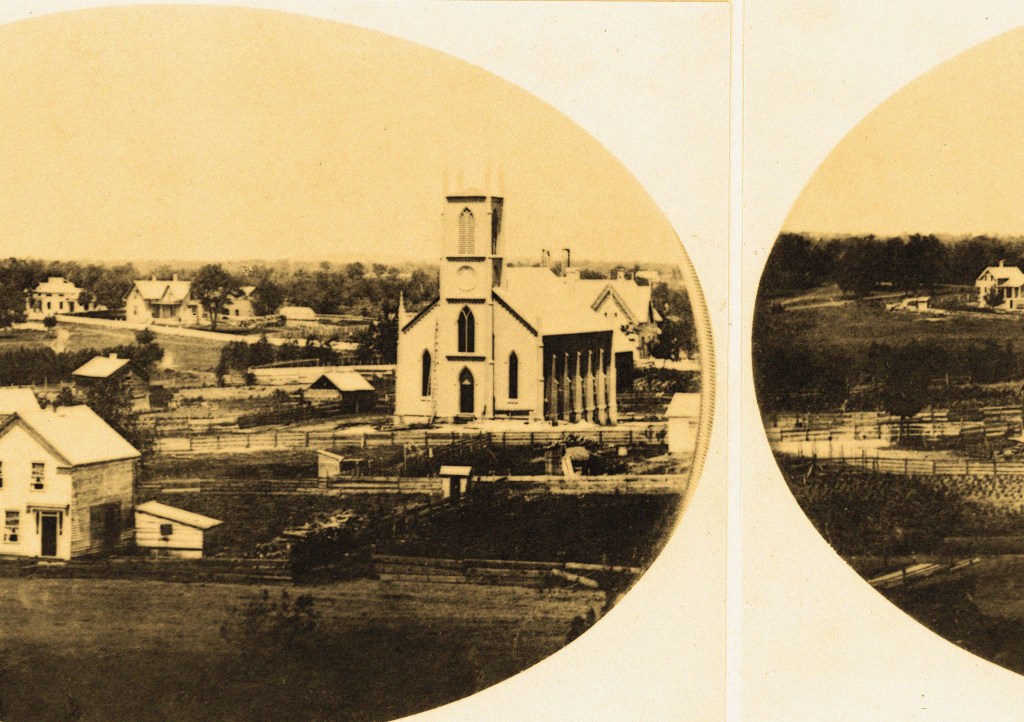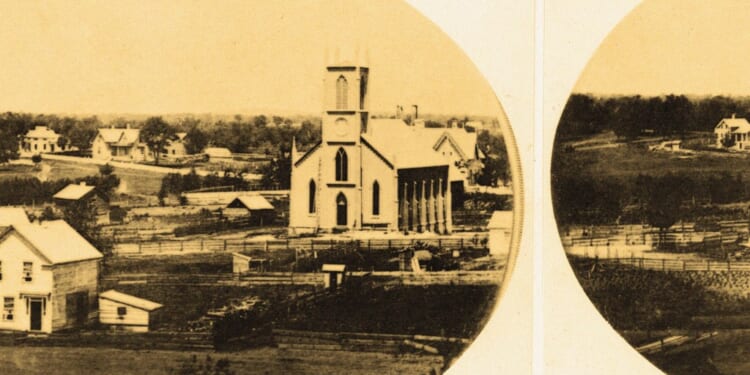
Abraham Lincoln understood the meaning of the American Civil War better than anyone in the United States. It was a war over slavery. But it was also a religious war—a “theological crisis,” as historian Mark Noll described it. In his second inaugural address, Lincoln made that clear: “Both [sides] read the same Bible and pray to the same God; and each invokes His aid against the other.” Both the Union and the Confederacy thought their societies were blessed by God and supported by his providence. They both claimed to be Christian nations.
Today, we are not in any immediate danger of violent civil war, but, as in the first half of the 19th century, our political divisions are advanced by politicians and pundits who “read the same Bible” and “pray to the same God.” Whether it is immigration, abortion, presidential power, sexual politics, or education, we continue to “invoke His aid against each other.”
History does not always provide us with answers to current debates—we historians like to say, with the novelist L.P. Hartley, that “the past is a foreign country, they do things differently there.” Yet sometimes the past can help us better understand the present by putting modern-day conflicts in a larger historical context. The 19th-century religious battle over slavery is one such context, and much of it still resonates in our present-day culture. Slavery ended with the passing of the 13th Amendment, but we are still using the Bible to wage political war over the meaning of America.
In 1861 and 1862, Northern clergy argued against Southern secession by appealing to national unity. Both Horace Bushnell, one of the most prominent Christians of the mid-19th century, and Albert Barnes, pastor of Philadelphia’s First Presbyterian Church, argued that Christians had a responsibility to obey the national government because it was established by God. “Civil Government,” Bushnell wrote, must be “accepted as a kind of Providential creation.” Barnes added, “Government is to be regarded as a Divine appointment, and as deriving its authority from God.”
If the Union was ordained by God, then Christians were required to submit to it. Northern clergy invoked New Testament passages to counter the beliefs of Southern secessionists. Francis Vinton, an Anglican minister at Trinity Church of New York, started his sermon “The Christian Idea of Civil Government” by quoting Romans 13:1-8, the Pauline passage urging the church in Rome to submit to the authority of the empire. If the Union was established by God, then “Disloyalty to the Constitution is, therefore, impiety toward God … To destroy this Union, therefore, is to commit a sin, which God will righteously punish by evils which no prescience can foresee, and no wisdom can repair.”
Like Vinton, Bushnell also used Romans 13 to take a direct shot at Southern rebellion: “Let every soul be subject unto the higher powers; for there is no power but of God.” E.E. Adams, the pastor of the North Broad Street Presbyterian Church in Philadelphia, reminded the Confederacy that “God never overlooks rebellion against his throne—never pardons the rebel until he repents and submits.”
Early in the war, Northern clergy railed relentlessly against the sin of secession and defended the idea that the purpose of the war was to keep the Christian Union intact. In 1861, Barnes told his listeners that the Civil War was not “a war for liberating by force the four millions of men which are held in bondage in the South.” Barnes believed that slavery was an “evil,” but the emancipation of the slaves was “not the object of the war,” nor should it in “any way become the object of the War to secure this result by force of arms.”
After Lincoln issued the Emancipation Proclamation on January 1, 1863, the ministerial response to the war began to change. Most historians agree that Lincoln’s decision to issue this decree gave the North a moral cause for which to fight that was more urgent than the preservation of the Union. After 1863, more clergy began to conceive the conflict as a war against slavery.
It would be wrong to give the impression that Northern clergymen only became interested in the emancipation of Southern slaves after 1863. The early-19th-century abolitionist movement had its roots in the Second Great Awakening. William Lloyd Garrison, one of the most radical of the abolitionists, believed that the United States could not truly call itself a Christian nation unless slavery was abolished. He proposed that the North secede from the Union to remain free from the sinful stain of slavery. Revivalist Charles Finney concurred with Garrison about the need for separation: “To adopt the maxim, ‘Our Union even with perpetual slavery,’ is an abomination so execrable as not to be named by a just mind without indignation.” Similarly, about a week before the attack on Fort Sumter in 1861, New England clergyman Zachery Eddy told his congregation to separate from the South so that the North could “develop all those forces of a high, Christian civilization.”
But it was after the announcement of the Emancipation Proclamation that Northern clergy began to more fully embrace the belief that the Civil War was a war to end slavery. No one took up this cause more strongly, at least among the clergy, than Henry Ward Beecher—the son of Lyman Beecher and the brother of Harriet Beecher Stowe—and the man whom Pulitzer Prize-winning historian Debby Applegate has called “the most famous man in America.”
Beecher was an anti-slavery crusader, but his tirade against slavery lacked any real theological sophistication. In the 1863 sermon, “National Prejudice and Penalty,” he concluded that slavery infringed upon human rights, and since God was always on the side of human rights, then slavery must be a violation against God. Though one could certainly make an argument that slavery was sinful because it violated the dignity of human beings who were created in the image of God, Beecher did not argue this way. Instead, he concluded that “if God is just, and if he rewards or punishes nations in this world, it is not possible for a nation systematically to violate every natural right of four millions of people, and go unpunished.”
Beecher was also hesitant to argue against slavery using biblical texts themselves. He instead appealed to the “voice of God” to justify the sinfulness of slavery. Here is Beecher, again, in his sermon “National Prejudice and Penalty”:
There are plenty of men who believe in Genesis, and Chronicles, and the Psalms, and Isaiah, and Daniel, and Ezekiel, and Matthew, and the other Evangelists, and the rest of the New Testament, clear down to the Apocalypse; there are plenty of men who believe in the letter of Scripture; and there are plenty of men who believe everything God said four thousand years ago; but the Lord God Almighty is walking forth at this time in the clouds and thunder such as never rocked Sinai. His voice is in all the land, and in all the earth, and those men that refuse to hear God in his own time, and in the language of the events that are taking place, are infidels.
“Men who believe in the letter of Scripture” was a reference to Southern evangelicals who employed a literal interpretation of the Bible to defend their belief that God sanctioned slavery. A Northern liberal Protestant, Beecher dismissed these Southern literalists and asked his hearers to end slavery regardless of what the Bible said.
For many Northerners, especially after Lincoln’s Emancipation Proclamation, the question remained: How could the Confederacy claim to be a Christian civilization and keep 4 million slaves in bondage? The religious leaders of the South had little problem reconciling slavery with such claims and viewed the Confederacy as a refuge for the godly amid the “infidelity” of the Union to which they once belonged.
The 19th-century South always understood itself to be a society informed by the teachings of the Bible. And nowhere in the New Testament, they claimed, did the Bible condemn slavery.
Southern clergy justified slavery with a host of biblical passages. In the book of Philemon, for example, the apostle Paul urged Onesimus, Philemon’s runaway slave, to return to his master. Romans 13, a passage employed by Northern clergy in their arguments against Southern secession, could also be used by Southerners as a biblical injunction for the submission of slaves to their masters. And there were always passages such as Ephesians 6:5: “Slaves, obey your earthly masters with respect and fear, and with sincerity of heart, just as you would obey Christ.”
Southerners reserved harsh judgment for what they believed to be the unbiblical approach to slavery taken by Northern abolitionists. In claiming that slaves should be set free, they argued, abolitionists violated the explicit teachings of Scripture. Many evangelical abolitionists, however, believed that the institution of slavery undermined the teachings of Christianity, including biblical passages about peacemaking, loving one’s neighbor, the dignity of all human beings, and the claim, in Galatians 3:28, that “there is neither Jew nor Greek, there is neither slave nor free, there is no male and female, for you all one in Christ.”
Such biblical claims did not convince Robert L. Dabney, a Virginia Presbyterian clergyman and one of the strongest defenders of slavery in the South. He argued that Christianity has always taught that slavery was a permissible institution. The notion that slaves had “rights” and thus deserved freedom was a modern idea introduced in the 18th century by the progressive thinkers of the Enlightenment. As Dabney put it, “Neither primitive, nor reformed, nor Romanist, nor modern divines taught the doctrine of the intrinsic sinfulness of slaveholding. The church as a body never dreamed of it.”
Southerners thought that abolitionism had no biblical legs to stand on. Anyone who believed that slavery was wrong would have to abandon a high view of the Bible’s authority. William Lloyd Garrison was a prime example of this trend. (So was Henry Ward Beecher.) When Garrison came to terms with the fact that the Bible seemed to support slavery, he rejected the Bible—or at least its literal interpretation. Writing in his abolitionist magazine, The Liberator, Garrison said, “To say that everything contained within the lids of the bible is divinely inspired, and to insist upon the dogma as fundamentally important, is to give utterance to a bold fiction, and to require the suspension of the reasoning faculties. To say that everything in the bible is to be believed, simply because it is found in that volume, is equally absurd.”
These kinds of public declarations concerning the Bible became fodder for Southern attacks on Northern fidelity. James Henry Thornwell, another powerful theological voice in support of slavery, wrote: “The parties in this conflict are not merely abolitionists and slaveholders—they are atheists, abolitionists and virtuous slaveholders—they are atheists, socialists, communists, red republicans, Jacobins on the one side, and friends of order and regulated freedom on the other.”
The clergy of the Confederate States of America believed that they were citizens of a Christian civilization precisely because they upheld the institution of slavery. Benjamin Palmer, the minister of the First Presbyterian Church of New Orleans, thought that the South had a divine mission to support this biblically sanctioned institution. The Confederacy had been called “to conserve and to perpetuate the institution of slavery as now existing.” It was a duty to “ourselves, to our slaves, to the world, and to Almighty God.”
Reflecting on the meaning of the Civil War, Dabney argued that slaveholders were doing the will of God by lifting the nation’s slaves “out of idolatrous debasement.” By Christianizing slaves, the South had brought “more than a half million adult communicants in Christian churches!” Through their regular attendance at Christian churches, Dabney argued, the enslaved learned how to be obedient to the Bible’s teachings on slavery and were thus able to live in a manner that was pleasing to God. The motives behind the mission to Christianize slaves, he wrote, were “not carnal, but evangelical.”
These were the two visions of the United States as a Christian nation that would clash in the Civil War. The Northern vision of Christian America would ultimately prevail. With Lincoln, many northern clergy believed God was moving the nation forward by ushering in a “new birth of freedom.” But the Confederate theologians’ view of slavery would continue to linger for decades in the form of segregation, Jim Crow laws, and white supremacy. We don’t fight over slavery anymore, but the battle for American identity continues, and it still has a religious dimension. The theological debate of the mid-19th century led to a civil war that cost more than 750,000 lives. How will our current culture war end?
















